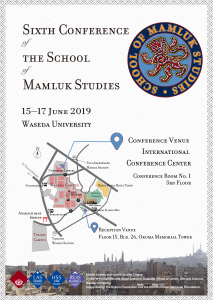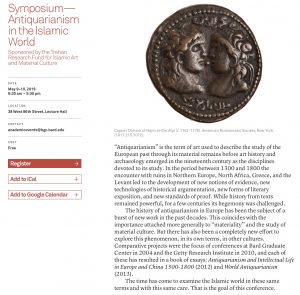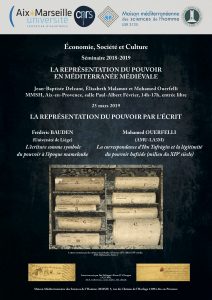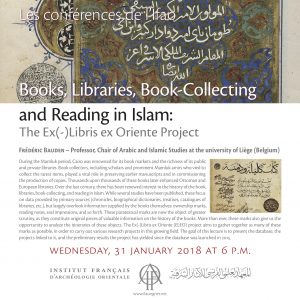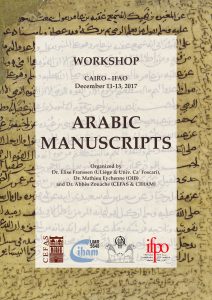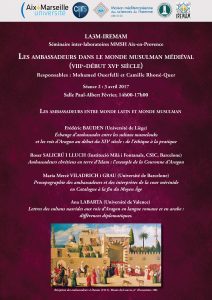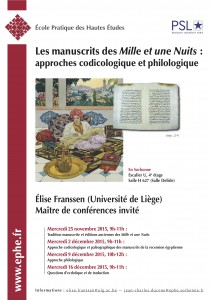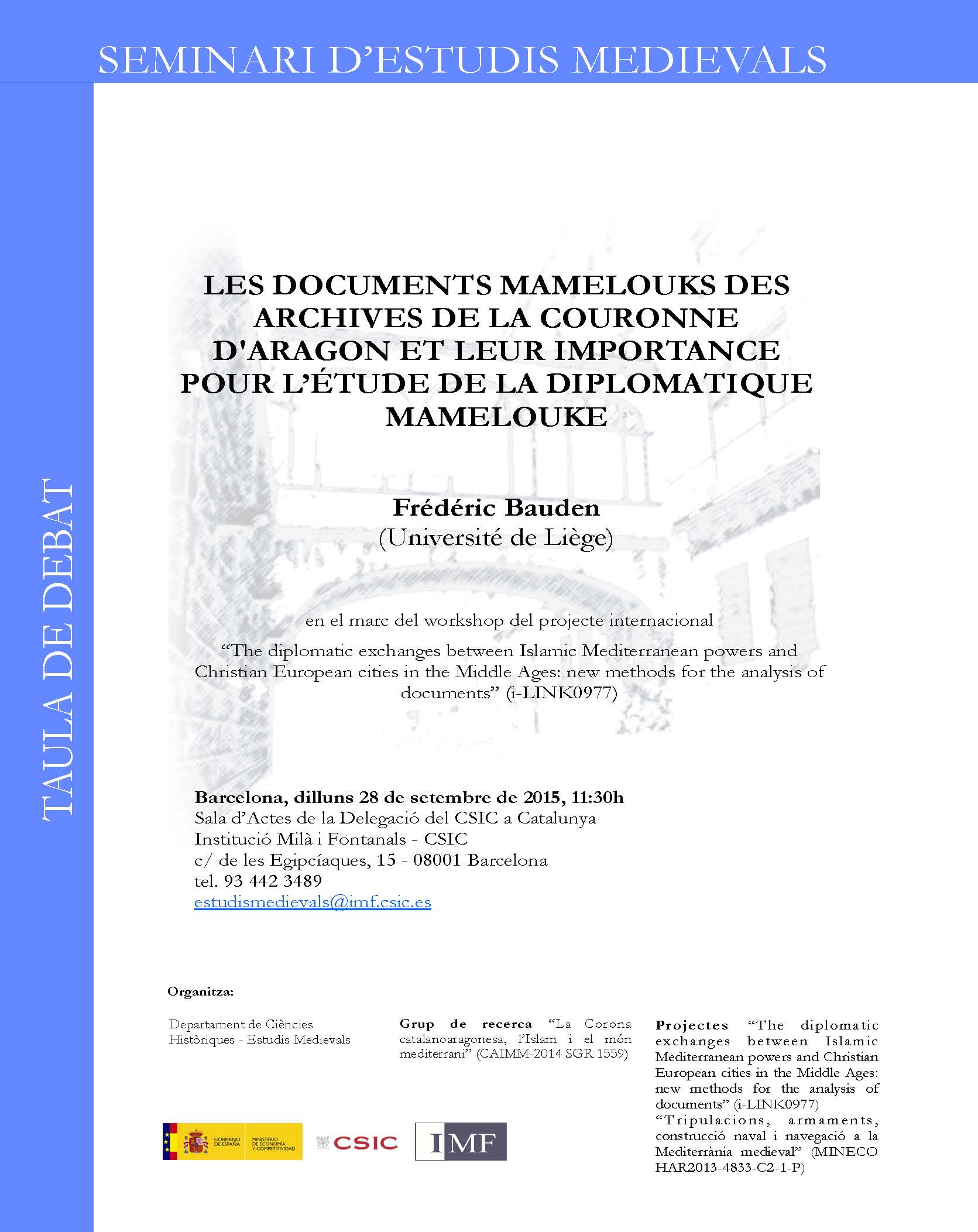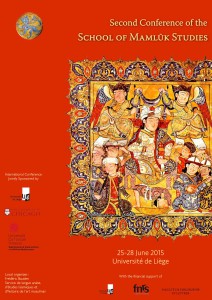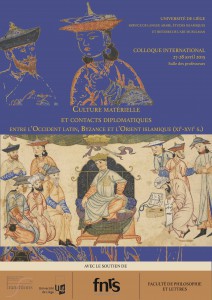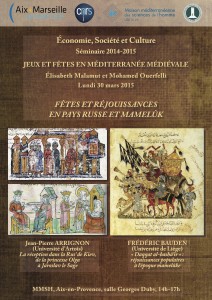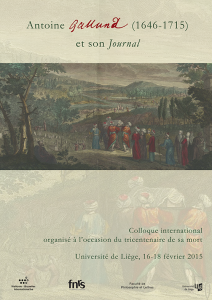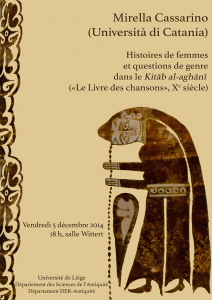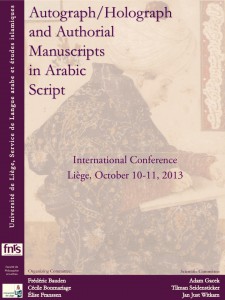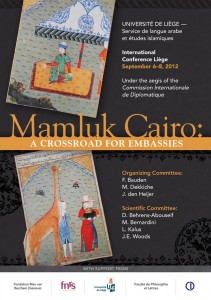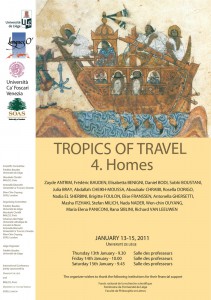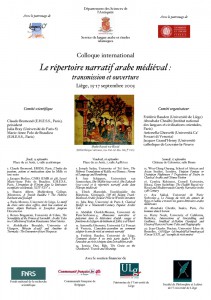Agenda
-
sam15Juin2019lun17Juin2019Waseda University, Tokyo
Sixth Conference of the School of Mamlūk Studies
Prof. Frédéric Bauden will read a paper entitled "Brokering power in Mecca: Rasulid-Mamluk diplomatic exchanges about the Meccan Sharifate". The paper is part of a panel entitled "The Versatile Approach to the Diplomatic Dialogue" and organized by Dr. Alessandro Rizzo (post- doc, CSIC, Barcelona, Liège University).
-
mar21Mai201918h15-19h30Ludwig-Maximilians-Universitäts München, Universitätshauptgebäude Geschwister-Scholl-Platz 1, Hörsaal M 014
Brokering power in Mecca: Rasulid-Mamluk diplomatic exchanges about the Meccan Sharifate
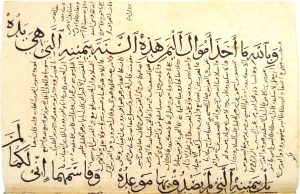 Lecture by Prof. Frédéric Bauden.
Lecture by Prof. Frédéric Bauden.If the control of Mecca (and of the Hijaz in general) represented for the Mamluks a source of legitimation (notably by guaranteeing the yearly organization of the pilgrimage), it appears that their grip on the Holy City was characterized as seasonal. Once the pilgrimage ended, the Sharifs enjoyed political autonomy. In the early ninth/fifteenth c., the Sharif Ḥasan b. ʿAjlān (r. 797–826/1395–1423) was an emblematic example of the power that his family availed itself of. Ḥasan particularly took advantage of the increase in trade between the Indian Ocean and the Mediterranean Sea that passed through the Hijaz to extend his power over the whole region. His exactions from pilgrims and merchants deeply annoyed both the Mamluk and the Rasulid sultans who tried to affect the situation by manipulating the local politics in Mecca.
Over the last decade, John Meloy and Eric Vallet have addressed numerous issues linked to Ḥasan’s reign, respectively from the point of view of the Mamluks and the Rasulids. Their studies were largely based on literary sources, with a limited use of documents. In this paper, I propose to tackle the events that took place between the years 816–20/1413–7, a period during which Ḥasan was briefly replaced by his nephew Rumaytha (818/1416), through the lens of documents. Apart from copies of letters preserved in Ibn Ḥijja’s Qahwat al-inshāʾ, I will also consider a unique Rasulid original letter dated 817/1415 reused as scrap paper by al-Maqrīzī. These documents offer a different insight into the way both sultans tried to face the threat posed by Ḥasan by means of diplomacy. -
jeu09Mai2019ven10Mai2019
-
lun25Mar201914h00-17h00Aix-en-Provence, MMSH, salle Paul-Albert Février
L’écriture comme symbole du pouvoir à l’époque mamelouke
-
lun17Déc201819h00Dar al-Athar al-Islamiyyah, The Al-Sabah Collection, Al-Kuwait, Koweit
Of Buying Many Books There Is No End: Paratextual Marks as a Source for the History of the Book in Islam. Lecture by Frédéric Bauden
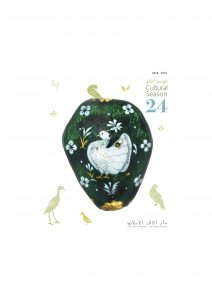 During the Mamluk period, Cairo was renowned for its book markets and the richness of its public and private libraries. Over the last century, there has been renewed interest in the history of the book, collecting and libraries. Published studies focused on data provided by primary sources, but largely overlook information supplied by the books themselves. Paratextual marks, the focus of this lecture, are now the subject of greater scrutiny, as they constitute original pieces of valuable information on the history of the books. More than ever, these marks also give us the opportunity to analyze the itineraries of these objects
During the Mamluk period, Cairo was renowned for its book markets and the richness of its public and private libraries. Over the last century, there has been renewed interest in the history of the book, collecting and libraries. Published studies focused on data provided by primary sources, but largely overlook information supplied by the books themselves. Paratextual marks, the focus of this lecture, are now the subject of greater scrutiny, as they constitute original pieces of valuable information on the history of the books. More than ever, these marks also give us the opportunity to analyze the itineraries of these objects -
jeu04Oct2018sam06Oct2018Sächsische Akademie der Wissenschaften zu Leipzig
15. Internationaler Kongress zur Diplomatik: Quellen zur Geschichte der „internationalen“ Beziehungen zwischen politischen Zentren in Europa und der Mittelmeerwelt (ca. 800–1600): Briefe – Urkunden – Verträge. Internationale Tagung der Commission internationale de diplomatique in Kooperation mit der Sächsischen Akademie der Wissenschaften zu Leipzig
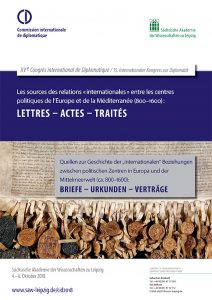 In the frame of the 15th International Congress on Diplomatics, Frédéric Bauden (Liège) and Marta Manso Rubio (Universitat de Barcelona - Institució Milà i Fontanals (CSIC)) will read a paper entitled "L’alliance conclue entre le sultan mamelouk Khalīl et le roi d’Aragon Jacques II en 692/1293" on 6 October 2018.
In the frame of the 15th International Congress on Diplomatics, Frédéric Bauden (Liège) and Marta Manso Rubio (Universitat de Barcelona - Institució Milà i Fontanals (CSIC)) will read a paper entitled "L’alliance conclue entre le sultan mamelouk Khalīl et le roi d’Aragon Jacques II en 692/1293" on 6 October 2018. -
jeu24Mai20189h-18h30Sala Archivio, Università Ca' Foscari, Venise
Launching RASCIO - Workshop, organized by Élise Franssen
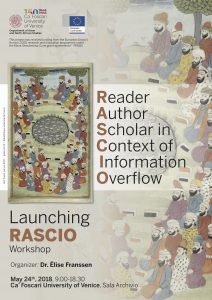 This workshop is the opening event of Élise Franssen's Marie Skłodowska-Curie project "RASCIO" (Reader, Author, Scholar in a Context of Information Overflow. How to manage and master knowledge when there is too much to know?" — grant agreement n° 749180; see here).
This workshop is the opening event of Élise Franssen's Marie Skłodowska-Curie project "RASCIO" (Reader, Author, Scholar in a Context of Information Overflow. How to manage and master knowledge when there is too much to know?" — grant agreement n° 749180; see here).It is intended to be a methodological and case-studies’ round-table. The different topics to be addressed are:
- Methodology and note-taking strategies
- Correspondence between scholars/littérateurs and networking
- Scholars’ libraries
- Digital humanities and on-line editions
For the full programme, see: Workshop RASCIO - program.
-
mer31Jan201818h00-19h00Le Caire, Institut Français d'Archéologie Orientale
Books, Libraries, Book-Collecting and Reading in Islam: The Ex(-)Libris ex Oriente Project. Lecture of Prof. Frédéric Bauden
During the Mamluk period, Cairo was renowned for its book markets and the richness of its public and private libraries. Book collectors, including scholars and prominent Mamluk amirs who vied to collect the rarest items, played a vital role in preserving earlier manuscripts and in commissioning the production of copies. Thousands upon thousands of these books later enhanced Ottoman and European libraries. Over the last century, there has been renewed interest in the history of the book, libraries, book-collecting, and reading in Islam. While several studies have been published, these focus on data provided by primary sources (chronicles, biographical dictionaries, treatises, catalogues of libraries, etc.), but largely overlook information supplied by the books themselves: ownership marks, reading notes, seal impressions, and so forth. These paratextual marks are now the object of greater scrutiny, as they constitute original pieces of valuable information on the history of the books. More than ever, these marks also give us the opportunity to analyze the itineraries of these objects. The Ex(-)Libris ex Oriente (ELEO) project aims to gather together as many of these marks as possible, in order to carry out various research projects in this growing field. The goal of this lecture is to present the database, the projects linked to it, and the preliminary results the project has yielded since the database was launched in 2015.
-
mer13Déc2017
-
lun11Déc2017mer13Déc2017IFAO - Cairo
Workshop - Arabic Manuscripts, taught by Élise Franssen
Organized by Dr. Elise Franssen (ULiege & Univ. Ca' Foscari ), Dr. Mathieu Eychenne (OIB) and Dr. Abbes Zouache (CEFAS & CIHAM)
The first research vector of the program "War in the Medieval Near East (11th-16th C.): Transmission of Knowledge, Social Practices and Sensitive Approach", aims at giving researchers access to - and studying- an unpublished documentation. It combines training, editing and analysing furūsiyya manuscripts whose dissemination is still poorly known.
In this program, manuscripts are considered as fully historical sources whose study should allow a better knowledge of the environment in which they were written, made and disseminated. Researchers aim at using all the information supplied by the artefacts and the documental notes that they contain. It is in this context that the first workshop "Arabic Manuscripts" is organized in IFAO; it will be followed, in 2018 and 2019, by two more specialized workshops focusing on the completion of a database and the edition of manuscripts.
This workshop aims at providing the participants with the basic codicological knowledge and at giving them the necessary operational autonomy required by their daily research. A practical approach has been privileged by the organizers: courses mixing presentation and exercises; specific hands-on sessions based on the original manuscripts preserved in IFAO.
Courses will be taught in English
-
lun03Avr201714h00-14h30Aix-en-Provence, LA3M-IREMAM, Salle Paul-Albert Février
Échange d'ambassades entre les sultans mamelouks et les rois d'Aragon au début du XVe siècle: de l'éthique à la pratique. Paper read by Prof. dr. Frédéric Bauden
-
lun13Fév2017ven17Fév2017Manchester, John Rylands Research Institute
"A Holistic Approach to Islamic Manuscript Studies" - Masterclass by Prof. F. Bauden
The John Rylands Research Institute Visiting Professor Frédéric Bauden (University of Liège) will be teaching a week-long masterclass on A Holistic Approach to Islamic Manuscript Studies.
-
jeu02Fév201718h00-19h30Manchester, John Rylands Research Institute
“Of Buying Many Books There is No End”: Towards a History of the John Rylands Library's Collection of Islamic Manuscripts. A Lecture by Prof. F. Bauden
Professor Bauden will be working with the Institute in January and February 2017 as part of the Institute’s Visiting Professorship Programme and on 2 February 2016 will deliver a Public Lecture details of which can be found below. The Lecture is free and open to all.
Rare are the manuscripts in Arabic script that do not bear a mark attesting to their past, be it a mention of the patron for whom the manuscript was produced, an act of pious donation, possession marks (handwritten or printed by means of a seal), loan statements, readers' notes, certificates of audition, transmission licenses, etc. Yet this is an area of research until now neglected. It is true that these marks, also called paratextual elements, are rarely mentioned in the manuscript catalogues, and even less in the editions that focus too often on the content, almost always overlooking the container. Thanks to these paratextual marks, it is possible to reconstruct the history of one manuscript in particular but also of a whole collection. The perusal of the collection of Islamic manuscripts held in the John Rylands Library yields several results allowing to reconstruct the itineraries followed by these sometimes multi-centennial objects, to identify the actors of their peregrination from the Islamic lands to their actual repository, and, in some cases too, to enlarge our knowledge of no longer existing Oriental libraries (private or institutional).
-
dim29Jan201710h30Musées Royaux d'Art et d'Histoire du Cinquantenaire, Bruxelles
Les manuscrits en écriture arabe : art, archéologie, culture de l'écrit - Conférence du Dr. Élise Franssen
L'asbl "Diffusion culturelle" des MRAH a pour but d'améliorer les connaissances des musées et organise chaque année une série de conférences destinées au grand public. Dans ce cadre, Dr. Élise Franssen prononcera une conférence au sujet des manuscrits en écriture arabe et abordera plus spécifiquement le cas du Coran des collections des MRAH dont elle a rédigé la notice de catalogue (références disponibles ici)
La culture arabe est très féconde en écrits : elle a donné naissance à d’innombrables manuscrits. L’importance du livre, et plus particulièrement du codex manuscrit, s’explique par plusieurs raisons, culturelles, religieuses ou encore pratiques, toutes passionnantes. Malheureusement, ces innombrables témoins de la culture arabe sont encore aujourd’hui peu connus. L’une des approches permettant de dévoiler des pans importants de leur identité et de leur histoire est la codicologie. Cette discipline, aussi appelée « archéologie du livre », a le vent en poupe. Quelques exemples d’études récentes montreront son importance et sa pertinence. L’enquête consacrée au Coran dit « safavide » des collections des MRAH en est un exemple éloquent.
-
sam19Mar201612h00-12h30Padova, Palazzo del Bo
Paper delivered by Prof. Dr. Frédéric Bauden
In the frame of the V Congresso Internazionale di Numismatica e di Storia Monetaria, Prof. dr. Frédéric Bauden will deliver a paper entitled: The Islamic Coinage of Barqa from the Conquest up to the Advent of the Fatimids.
-
mer16Déc20159h00EPHE - En Sorbonne, Escalier U, 4ème étage, Salle Delisle
Les Manuscrits des Mille et une Nuits : Approches codicologique et philologique
-
mer09Déc2015
-
mer02Déc20159h00EPHE - En Sorbonne, Escalier U, 4ème étage, Salle Delisle
Les Manuscrits des Mille et une Nuits : Approches codicologique et philologique
-
mer25Nov20159h00EPHE - En Sorbonne, Escalier U, 4ème étage, Salle Delisle
Les Manuscrits des Mille et une Nuits : Approches codicologique et philologique
-
jeu19Nov2015ven20Nov2015Università Ca' Foscari, Venise
I Manoscritti egiziani delle Mille e una Notte
Cours d'Élise Franssen dans le cadre du programme Erasmus+ pour les enseignants.
-
lun28Sep201511h30-12h30CSIC, Barcelone
Les documents mamelouks de l’Archivo de la Corona de Aragón et leur importance pour l’étude de la diplomatique mamelouke
-
jeu25Juin2015dim28Juin2015Université de Liège
Second International Conference of the School of Mamlūk Studies
The conference will be divided into two parts:
1) The first day of the conference (June 25) will be themed. The theme of this part of the conference will be: "The Mamlūk Sultanate and Its Periphery". If our knowledge of the capital (and the provincial capital of Damascus) is rather comprehensive, the periphery of the sultanate has received less attention. The aim of this themed day is thus to focus on those areas located far from the capitals and close to borders (either natural, like the sea or mountains, or political). This will allow specialists in a wide gamut of fields, from history to architecture, from economy to administration, from diplomacy to politics, to address various issues linked with, e.g., the concept of periphery, the control of the borders, the intellectual, economic, and artistic life in border cities, etc.
2) The following three days of the conference (June 26–28) will be structured in panels, which may focus on any aspect of the intellectual, political, social, economic, and artistic life of the Mamlūk period.
Language :
The official language of the conference will be English.Fees :
The conference registration fees will be 40 € for participants and attendees. A farewell dinner will take place on June 27 at a cost of 50 €. Payment of the fees (registration and farewell dinner) must be received by April 30. -
lun22Juin2015mer24Juin2015Université de Liège
Intensive course: A Holistic Approach to Manuscript Studies
A three-day intensive course intended for advanced graduate students, given by Prof. Dr. Frédéric Bauden (University of Liège) with the assistance of Dr. Elise Franssen (University of Liège), will be held immediately before the conference of the School of Mamlūk Studies. The course will be focused on manuscript studies. The course, intended to help students who need to work on manuscripts for their research, will provide them with the most important tools and methods to achieve their goal. Codicology is essential to describe a manuscript and to analyze its support, but it needs to be used with other disciplines in order to apprehend a manuscript (i.e., also its text) in all its complexity. It is important to note that this course is not just about codicology: theoretical issues will be addressed in the morning sessions while afternoon sessions will be devoted to practice. To this end, they will be held at the manuscript room, where the students will have the opportunity to work on a selection of manuscripts. A very good level of Arabic is required (minimum four years of Arabic at the university level).
-
dim17Mai201512h40-14h40The University of Kyoto
Al-Maqrīzī at Work: The Case of His Collection of Opuscules
Paper presented by Prof. Dr. Frédéric Bauden in the frame of the panel "Historians in the Pre-Modern Middle East: Their Aims, Techniques and Products" organized by Nobutaka Nakamachi and Teruaki Moriyama.
31st Annual Conference of the Japanese Association of Middle Eastern Studies
-
jeu14Mai201515h00-16h00Waseda University, Tokyo
Certificates of pilgrimage in the Mamluk period: Continuity and disruption of a social tradition
Lecture by Prof. dr. Frédéric Bauden
-
lun11Mai201518h00-19h30The University of Tokyo, Hongo Campus
Towards an archaeology of scholarship in pre-modern Islam: Investigating the working method of scholars
Lecture by Prof. Dr. Frédéric Bauden
-
lun04Mai2015mer06Mai2015The University of Tokyo, Komaba: Naito Seminar House, Yamanashi
Looking over al-Maqrīzī’s shoulder: The working method of a Medieval Egyptian historian
Seminar held by Prof. Dr. Frédéric Bauden.
-
lun27Avr2015mar28Avr2015Université de Liège
Culture matérielle et contacts diplomatiques entre l’Occident latin, Byzance et l’Orient islamique (XIe-XVIe siècle)
-
lun30Mar2015
-
lun16Fév2015mer18Fév2015
-
ven05Déc2014
-
jeu10Oct2013ven11Oct2013
-
lun06Fév2012mer08Fév2012
-
jeu13Jan2011sam15Jan2011
-
jeu15Sep2005sam17Sep2005


